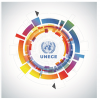Press Releases
Displaying Results 1 - 13 of 13
SPECA countries have experienced the effects of climate change and the COVID-19 pandemic on key aspects of economic development and cooperation, with negative consequences for sustainable development. COVID-19 related restrictions and border closures caused serious disruption to supply chains and
The United Nations has released a first version of a Handbook on Provisions and Options for Trade in Times of Crisis and Pandemic. Work on the Handbook was initiated by ESCAP, UNCTAD and other UN Regional Commissions after realizing that the hundreds of regional trade agreements in place provided
The extraction of raw materials worldwide has more than doubled since 1990 and could double again by 2060, fuelling environmental degradation and increased vulnerability to climate change. As major users and producers of natural resources, 56 countries of the UNECE region, spanning from North
If the UNECE region follows current trends, by 2030 it will achieve only 23 of the 169 SDG targets. However, only 89 targets can be assessed while for the remaining 80, no assessment can be made due to insufficient data.
For 57 targets, progress needs to accelerate if we are to achieve the targets
Across the world, 153 countries share rivers, lakes and aquifers. Transboundary basins cover more than half of the Earth’s land surface, account for an estimated 60 per cent of global freshwater flow and are home to more than 40 per cent of the world’s population. Transboundary water cooperation is
UN Resident Coordinators based in the countries of Europe and Central Asia have noted that most countries are prioritizing economic recovery during the COVID-19 period and that environmental perspectives are often ignored. The regional interagency Issue-based Coalition on Environment and Climate
In light of unprecedented heatwaves and series of lockdowns that hit cities across Europe and North America over the last year, ensuring there are green urban spaces that could help bring down the temperature and provide safe spaces for recreation and relaxation has never been higher on policy-
As countries all over the world aim at ‘building back better’ from the COVID-19 pandemic , the recently-launched UNECE People-first PPP Evaluation Methodology for the Sustainable Development Goals can support their efforts by providing a set of benchmarks and indicators to score infrastructure
Micro-, small-, and medium-sized enterprises (MSMEs), and women-led MSMEs in particular, have been especially vulnerable to the impacts of the COVID-19 crisis. However, the crisis has also caused a dramatic shift in the business-as-usual approach and paved the way for innovations, green growth, and
Countries participating in the United Nations Special Programme for Economies of Central Asia (SPECA) have recognized the need for a more integrated approach towards structural economic transformation in order to build back better while staying on track to achieve the Sustainable Development Goals
Car sharing and carpooling are two of the most visible and rapidly evolving areas in the shift towards sustainable mobility and could support Central Asian countries’ sustainable post-pandemic recovery, according to a new UNECE study. Shared mobility initiatives can contribute to more efficient
Micro-, small and medium enterprises (MSMEs) are the backbone of the economy in the UNECE region and have been hard hit by the COVID-19 economic crisis. This stress in turn impacted the supply chains of many industries, especially those involved in supporting essential services required for the
With almost half of the world under lockdown, the continued supply of certain critical raw materials needed for an effective response to the COVID-19 pandemic has become a concern.
The Active Pharmaceutical Ingredients (APIs) and excipients of several drugs, including antibiotics such








